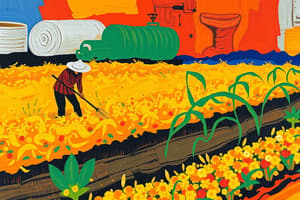Podcast
Questions and Answers
What is the primary goal of crop production and management?
What is the primary goal of crop production and management?
- Minimizing soil acidity
- Promoting weed growth
- Achieving maximum yield (correct)
- Maximizing negative impacts on the environment
Which aspect does soil preparation for crop production involve?
Which aspect does soil preparation for crop production involve?
- Harvesting the crops
- Adding organic matter to improve soil structure (correct)
- Pruning the crops
- Transporting the seeds
What is the purpose of irrigation in crop production?
What is the purpose of irrigation in crop production?
- To reduce soil fertility
- To provide water to crops in arid regions (correct)
- To hinder crop growth
- To increase weed growth
Which planting technique involves moving young plants from one location to another?
Which planting technique involves moving young plants from one location to another?
Why is choosing the right crop variety important in crop production?
Why is choosing the right crop variety important in crop production?
What is a crucial step in soil preparation for crop production related to soil pH?
What is a crucial step in soil preparation for crop production related to soil pH?
What is the objective of providing water to plants?
What is the objective of providing water to plants?
Which type of fertilizers release nutrients slowly?
Which type of fertilizers release nutrients slowly?
What is a common weed control strategy involving the use of herbicides?
What is a common weed control strategy involving the use of herbicides?
What approach combines multiple tactics to manage diseases and pests effectively?
What approach combines multiple tactics to manage diseases and pests effectively?
What is the process of gathering the matured crop from the field called?
What is the process of gathering the matured crop from the field called?
Which practice aims to meet the needs of the present without compromising future generations' ability to meet their own needs?
Which practice aims to meet the needs of the present without compromising future generations' ability to meet their own needs?
Flashcards are hidden until you start studying
Study Notes
Crop production and management is the practice of growing crops with the goal of achieving maximum yield while minimizing negative impacts on the environment. It involves various aspects such as soil preparation, planting, irrigation, fertilization, weed control, disease and pest management, harvesting, and post-harvest handling. This process requires knowledge about agricultural techniques, crop varieties, climate conditions, and market demand to ensure profitable and sustainable farming operations.
Soil Preparation for Crop Production
Soil plays a crucial role in agriculture and it must be prepared properly before planting crops. This includes preparing the seedbed by removing weeds, plowing the land, and adding organic matter such as compost or manure to improve soil structure, nutrient content, and water retention capacity. The right balance between soil acidity and alkalinity (pH) should also be maintained for optimal growth.
Planting Techniques and Seed Selection
Planting techniques can vary depending on the type of crop being grown. For example, direct seeding involves scattering seeds directly onto the field surface, whereas transplanting refers to moving young plants from one location to another. Choosing the right variety of a particular crop that is adapted to local climate and soil conditions is essential for successful yields.
Irrigation Practices
Irrigation is necessary for crops that grow in arid regions or during dry seasons. It can be done through various methods such as sprinklers, drippers, and furrow irrigation. The objective is to provide an adequate amount of water to the plants without causing damage due to overwatering.
Fertilization and Nutrient Management
Fertilizers are essential for providing nutrients to the crops throughout their growth cycle. They can be applied either in solid form or dissolved in water. Organic fertilizers like compost and manure release nutrients slowly, while synthetic fertilizers deliver immediate nutrition but have potential environmental impacts if misused. Balancing the application of different types of fertilizers is crucial for maintaining soil health and crop productivity.
Weed Control Strategies
Weeds compete with crops for resources like sunlight, water, and nutrients. Therefore, effective weed control strategies must be adopted. These include mechanical methods such as tillage, mulching, and hand weeding; chemical methods involving herbicides; and biological methods including using natural enemies of weeds like insects or pathogens.
Disease and Pest Management
Diseases and pests can cause significant losses in agricultural production. Integrated Pest Management (IPM) is a widely used approach that combines multiple tactics to manage these issues effectively. This may involve monitoring for signs of disease or pest infestations, using resistant crop varieties, employing biological control agents, and applying chemical treatments judiciously.
Harvesting and Post-Harvest Handling
Harvesting is the process of gathering the matured crop from the field. It should be done at the right time to avoid damage or loss of quality. Post-harvest handling includes storing, processing, and transportation of the harvested crops to markets or further processing facilities. This phase requires careful handling to maintain product quality and minimize waste.
Sustainable Crop Production Practices
Sustainable agriculture aims to meet the needs of the present without compromising the ability of future generations to meet their own needs. This involves adopting practices that minimize the use of non-renewable resources, reduce pollution, and maintain soil fertility. Examples of sustainable practices include crop rotation, intercropping, and use of cover crops to improve soil health.
In conclusion, crop production and management is a complex process that requires knowledge and expertise in various agricultural techniques. By understanding and implementing these practices, farmers can optimize their yields while minimizing negative impacts on the environment and ensuring the long-term viability of their operations.
Studying That Suits You
Use AI to generate personalized quizzes and flashcards to suit your learning preferences.




